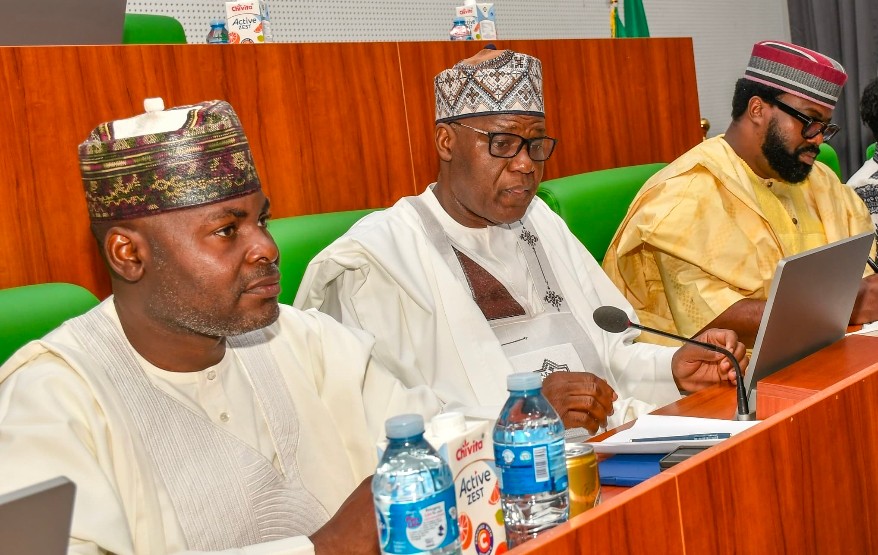News
Dogara Urges Tinubu to Ensure Transparency in Tax Reform Implementation

By Angel Ike
Former Speaker of the House of Representatives. Yakubu Dogara, has urged the government to ensure transparency and sustained implementation to secure public trust on President Bola Tinubu’s tax reforms.
He said the tax reforms is the most audacious overhaul of Nigeria’s fiscal framework in decade.
Dogara stated this while delivering the maiden Distinguished Parliamentarian Lecture organised by the House of Representatives Press Corps, in Abuja.
His lecture, titled “Navigating Tax Reform in Nigeria: Insights on President Tinubu’s Policies”, examined the origins, scope, and expected impact of the tax reforms encapsulated in the Nigeria Tax Act (NTA) 2025 and related legislation.
Dogara said President Tinubu inherited a dwindling economy riddled with “economic debris,” including excessive deficit financing through Ways and Means, dual exchange rates that enriched a few at the expense of many, and crude oil forward sales tied to foreign loans, arguing that these structural distortions made urgent reforms inevitable,
“By the time President Tinubu took office, N22.7 trillion had been printed and injected into the economy, destroying the value of the naira. Some anointed people were making hundreds of millions off forex allocations without producing any goods or services whatsoever.
“From day one, it was clear that something urgent, nay revolutionary, must be done to prevent our economy from imploding,” he said, stressing that the President had acted with courage despite fierce oppositions.” he said.
He highlighted the key provisions of the reforms, which consolidate 16 federal tax statutes into four principal Acts:
Nigeria Tax Act (NTA) 2025: Consolidates multiple tax laws into a unified framework, expands the tax base to cover digital services and virtual currencies, and introduces a 15% minimum effective tax rate for large companies.
Nigeria Tax Administration Act (NTAA) 2025: Modernizes assessment, collection, and compliance rules, introduces simplified filing for low-income earners, mandates the use of unified Taxpayer Identification Numbers (Tax IDs), and establishes a Tax Ombudsman’s office.
Nigeria Revenue Service (Establishment) Act (NRSEA) 2025: Establishes the Nigeria Revenue Service to replace the FIRS, with expanded powers and mandatory transparency reporting.
Joint Revenue Board (Establishment) Act (JRBEA) 2025: Harmonizes federal-state revenue sharing and coordinates dispute resolution through a Tax Appeal Tribunal and Ombudsman.
He added that the reforms, which will be fully operational by January 2026, are designed to simplify Nigeria’s complex tax regime, broaden the tax net, encourage compliance, and align domestic rules with global standards.
Quoting the report of the Presidential Committee on Fiscal Policy and Tax Reform chaired by Prof. Taiwo Oyedele, Dogara said the reforms were conceived to “protect the poor, empower businesses, encourage investment, and ensure fairness across society.”
Among the reliefs introduced are exemptions for small companies with turnover of N100 million or less, rent reliefs for salaried workers, tax credits for upstream oil operators, and full income tax exemption for individuals earning N800,000 or less annually.
The reforms also abolish multiple sectoral levies, replacing them with a single 4% development levy, while new provisions bring digital gains, crypto assets, and foreign exchange earnings into the tax net.
Dogara addressed concerns over a 5% fuel surcharge captured in the new Act, saying it was not a new tax but a restatement of an existing provision in the Federal Roads Maintenance Agency (FERMA) Act, 2007.
He stressed that the surcharge would not apply to household energy products such as kerosene, cooking gas, or compressed natural gas, and would only take effect after the Finance Minister issues an official gazette order.
“This safeguard eliminates recklessness and ensures timing and economic conditions are carefully considered,” he stated.
Dogara also highlighted challenges around uncertainty in interpretation, technological readiness, skilled manpower, and short-term compliance costs.
“The drive towards full digitalization, from e-invoicing to automated tax filings, promises efficiency but demands a significant upgrade in our own digital capabilities and cyber security,” he said.
He said businesses must invest in systems and training to adapt.
The former Speaker stressed, “successful tax reform requires public trust. True tax reform is not about raising rates, but about raising trust. When citizens can see where their naira goes, they are proud to give it.”
Dogara urged the government to ensure revenues raised are transparently deployed to build roads, power industries, and improve hospitals and schools.
“Let this reform be a pact between the government and the private sector, a promise that if we contribute diligently, the government will deploy those resources responsibly,” he said.
